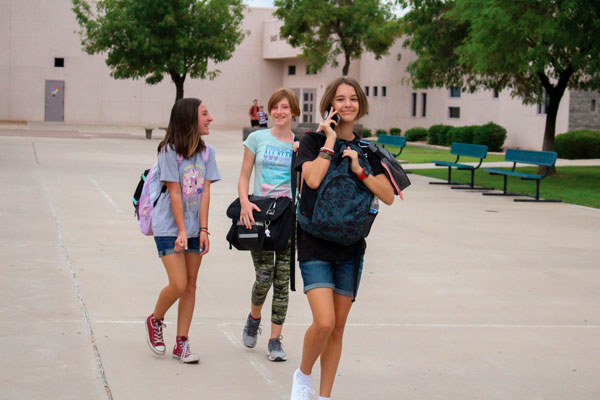Designing schools to be places of belonging where students feel safe and supported is a top priority for Mesa Public Schools.
During the summer, school leaders focused on enhancing the district’s teaching and learning programs, and ensuring that the physical, social, and emotional well-being of students are met when they returned to school this year.
Campus technology upgrades, school modernization, and collaborative spaces for learning are just a few of the new elements that will be seen throughout the district to improve the learning environment.
Mental health support for students is an integral part of school design since it has a significant impact on students which goes far beyond academic performance only. Campus support systems offer practical or emotional support to help students manage stress and anxiety.
MENTAL HEALTH RESOURCES
Students experiencing a mental health crisis have a new way to reach out for help through the 988 Suicide & Crisis Lifeline. By calling or texting 988, the line routes callers across the United States to trained crisis counselors who can help 24 hours a day. They provide support to anyone experiencing suicidal, substance use, a mental health crisis, or any other kind of emotional distress.
Dr. Melissa Valenzuela Settle, a social-emotional learning department specialist at Mesa Public Schools, shares that the district follows best practices governed by the American School Counseling Association (ASCA) National Model to foster personal growth.
“We want our students to be able to manage their emotions and ensure that we are modeling these behaviors for our children and students,” says Dr. Settle. Dr. Settle shares that mental health is really the overall health of a student and incorporates things like making sure that students are sleeping well and eating nutritious meals, along with learning how to manage their emotions.
“Mental health is about regulating emotions,” says Dr. Settle. “It’s about seeing and looking at something and understanding why one is getting upset and if they can get to the real core of the issue and have the bandwidth to recognize it so they can regulate their feelings. Students need to be able to question if they are acting on emotions or facts.”
SCHOOL COUNSELORS ADDRESS NEEDS
Dr. Maria Ramirez is a behavior intervention counselor at Rhodes Junior High School, serves as a district coach for other counselors, and shares that they support students’ needs in a variety of ways.
“Providing avenues for students to develop a sense of belonging and addressing the barriers that prevent students from being successful are the No. 1 things that we are doing to help our students,” Dr. Ramirez said.
Along with addressing students’ hierarchy of needs, counselors engage with the community, parents, business owners, and the Mesa Police Department as part of an advisory council to ensure all stakeholders are kept abreast of school dynamics and needs. Student lessons are aligned with the Collaborative for Academic, Social and Emotional Learning (CASEL) framework and its five components, which include self-awareness, self-management, responsible decision-making, relationship skills, and social awareness.
Mesa Public Schools partners with the Arizona Adverse Childhood Experiences Consortium (AZ ACEs Consortium) to provide staff members the education they need to address the barriers and challenges that many of our students experience and also works to bridge gaps that may exist.
Students may be faced with issues that can affecttheir social and emotional wellness. Mesa Public Schools provides comprehensive support for students and their families, so that they may be successful academically, socially, and emotionally. In a culture of learning and wellbeing, students and families need to understand that it’s always okay to reach out and ask for help.
For more information on Mesa Public Schools, visit mpsaz.org


